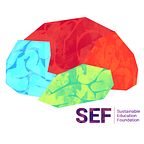Meet Sri Lankan Researcher — Varakini Sanmugadas
What are you currently working on or worked on before?
I’m currently engaged in Multidisciplinary analysis and design optimization of aircraft with Virginia Tech, USA.
What encouraged you to pursue your research topic?
I was offered a research assistantship by my mentor at Virginia Tech on this topic. At the time of acceptance, I saw the short-term project as a good opportunity to transition from civil engineering to aerospace engineering.
As we were working on an in-house MDAO framework, I could directly apply the structural concepts learned at the undergraduate level, while exploring new areas like controls and aerodynamics. But as I continued in this direction and take relevant graduate courses, I found that I really enjoyed the challenge of bringing together concepts from different disciplines and fitting them together like a jigsaw puzzle. With each new piece of capability, one codes or debugs in the main MDAO framework, one sees the improvement in the final design.
It is exciting to see this slow, but steady, progress towards an efficient, automated design framework. Most major aerospace companies and research groups are invested in R&D in this area to achieve cleaner and more energy-efficient designs and it’s gratifying to add a facet to this knowledge pool. In the past year, I have had the opportunity to work on a NASA-funded project as well as another, though slightly different, one by Toyota, and it has been a great learning experience!
Where do you find your best inspiration for your work?
I like to take one step at a time and keep working till I finish that. Right now it is my Ph.D. program and I like to tell myself often that each day of work I put in, I am one day closer to the completion of that goal.
Based on these motivations, accepting a research assistantship in a discipline far removed from my comfort zone and discovering that I actually liked it has been one of my biggest personal achievement so far.
Can you share with us some of your publications?
Sure, you can find them here. These are from my undergraduate and post-graduate work in Sri Lanka. A paper on the current MDAO project is under review.
What lessons would you share with a budding researcher?
- Understand the core concepts. The rest, you can always refer back to in a good book or lecture note. This might not be great exam advice, but that’s all you need for research :)
- In career decisions, take advice, but be aware that a person’s advice is always tinged by their personal preferences and commitments.
- Have strict working hours, so you don’t work too little, or too much!!
What motivated you to be a researcher?
I have always found that I am not satisfied if I don’t understand something “intuitively” and cannot “feel” it. Being a researcher gives you the time (and funding!!) to sit back and actually think something through, ask questions, and discuss with a team of like-minded people.
When I was a kid, my dad used to encourage me to question the things we see around us, be it social norms, or something like, how does a plane fly. A researcher has the license to do that in the grown-up world, in a more professional and accepting setting.
Also, I could never see myself in a job with a daily routine. As a researcher in a multi-disciplinary field, I am never short of new things to do (even during the quarantine)!
According to your opinion, what are the changes that the Sri Lankan education system needs to do, in order to meet the requirement of the international industry and academia?
1. More interdisciplinary research and inter-departmental and inter-university communication
2. Undergraduates (and even, A/L students) should be given more freedom in the choice of their courses so that they can explore different areas or pick courses tailored to their interest
3. For engineering: Build a greater appreciation for mathematics by taking a more application-based approach. Right now, they are taught in a highly theoretical manner in the earlier semesters, making it seem abstract and irrelevant, especially to students planning on an industrial career. Here again, a more flexible course requirement might help, as students can take these courses as and when they see fit.
4. Offering industry-recognized continuous professional development (CPD) opportunities.
